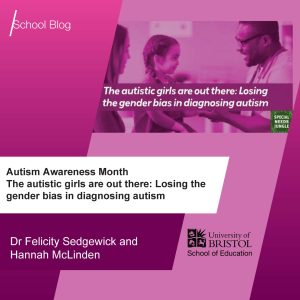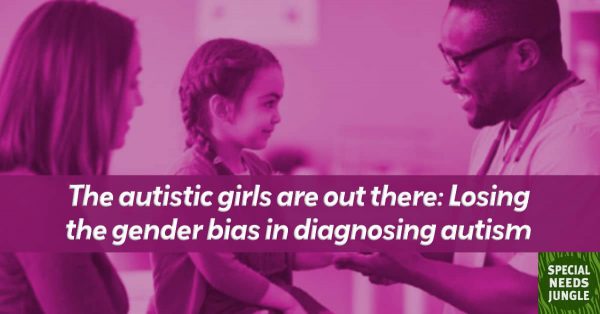 By Dr Felicity Sedgewick and Hannah McLinden, University of Bristol
By Dr Felicity Sedgewick and Hannah McLinden, University of Bristol
It has always been the case that the number of boys being diagnosed with autism far outnumbers the number of girls. While it used to be thought it was the “extreme male brain”, it’s now thought that diagnosis has historically just been missed in girls. For one, many autistic females develop “masking” behaviours to try to fit in, but a bigger problem is that autism checklists are designed to capture behaviours most displayed by males. It’s not uncommon for women, like myself, to be diagnosed much later in life, often as a result of their own children’s diagnosis.
Both researchers and autism community members want the diagnostic process to change, removing the unintended barriers to female diagnosis. The question is, how are clinicians responding? Dr Felicity Sedgewick and Hannah McLinden from the University of Bristol, have researched how changes are being made, whether they are changing widely and quickly enough, and if the changes will ensure equality of access to diagnosis and post-diagnostic support.

Diagnosing autistic girls – what do clinicians say?
A lot of families are familiar with the fact that it is often harder for a girl to be diagnosed as autistic than a boy (as are lots of adult autistic women). Many potential reasons for these difficulties have been talked about as well: lack of understanding of different presentations; diagnostic questionnaires and interviews which are looking for ‘male’ behaviours; and bias amongst clinicians who still assume only boys can be autistic, to name but a few.
Equally, the knowledge about autistic girls has grown massively in the last decade. There are now hundreds of research papers looking at their experiences of everything from friendship to their planning skills. There are books and TEDtalks and films about the lives of autistic women, reflecting back on their lives before and after diagnosis, and the difference it made for them. People talk about the improvement to their self-understanding and mental health especially, something which is vital considering that autistic people are more likely to attempt, and complete, suicide. A lot of the talks, papers, and blogs come with recommendations for how to improve recognition and diagnosis of girls, so that they can be spotted and supported earlier.
What is less clear is whether this knowledge, and these recommendations, are being taken up by the professionals involved in the diagnostic process.
How are clinicians changing?
We wanted to investigate this, in a small-scale way, and see what changes clinicians make to allow for the differences we know often exist between autistic boys and girls, in light of all the new knowledge now out there. We interviewed nine people, from school staff to clinical psychologists, who have a role either in initial referrals, screenings, or full assessments, and asked them whether they make any adaptations when they are talking to a girl and her family, and if so, what these are.
The first, reassuring, thing to know is that we found all the clinicians did know that autistic girls can present differently to autistic boys (and that this is not a universal thing – some boys present with quieter, more anxious behaviours as well as some girls fitting traditional stereotypes). They talked about girls having special interests more like their peers, or their friends being their special interests; they talked about girls being more likely to have shutdowns rather than meltdowns; and they talked about masking being a particular issue for girls which directly impacted how difficult it was to do an accurate diagnostic assessment. So the knowledge was there, at least in our sample.
Knowledge from personal experience rather than by training
Most of the participants had found this knowledge by themselves, because of their own interest in the topic – sometimes because of their own interactions with the diagnostic system on behalf of their children. Autism in girls hadn’t been covered in official training for either people in schools or psychologists, which means that while our group had a good understanding of autistic girls, it is likely that people who don’t have that interest also don’t have much knowledge – and these might be the clinicians we see who still carry biased assumptions about whether girls can be autistic at all.
Uneven learning created a postcode lottery
How this knowledge was then applied in the diagnostic process was varied. While one or two people said that their area had started ‘neurodiversity forums’ where multiple professionals would get together to discuss cases (not targeted at identifying autistic girls, but doing so anyway), mostly the changes being made were informal.
Examples included having a second professional be present in the assessment, to try to pick up on the more subtle clues which one person might miss, or making sure to ask follow-up questions to try to get ‘behind’ the mask an autistic girl might be showing them. Nobody reported any formalised changes to the diagnostic process or that had been recommended by the people in charge.
This means that there is in effect a postcode lottery for autism diagnosis in girls, where a family in one area might be lucky and get a clinician who has an interest, the knowledge, and makes adaptations to help support an accurate diagnosis, whereas a family in another area might get someone who doesn’t really know about autistic girls, who takes the mask at face value, and refuses the diagnosis because she doesn’t fit the stereotypes.
Post-diagnostic support for girls is lacking, but diagnosis in important
The final point our interviewees raised was that there is a significant lack of support after diagnosis for autistic girls. On top of diagnostic services being designed around the assumption that most people they see will be male, support groups, autistic-friendly activities, and even school-based policies and interventions often assume the same thing.
This means that for some autistic girls, getting the diagnosis actually changes very little about their lives or the challenges they face, because the support is not really in place to help them. This led some of the professionals to question whether it was ‘worth’ a girl getting the diagnosis – although many others argued that it is important to have the diagnosis because this is how you access funding and what support there is. From research, we also know how valuable it is for someone to know that they are autistic, as it helps them to understand themselves better and is associated with better self-esteem, mental health, and general wellbeing.
More improvement is needed
Overall, our study suggested that the knowledge about autistic girls is there for some clinicians, and that it is likely to be improving as more and more autistic girls and women are seen in society and in the media. The impact this has on professional practice, though, is informal rather than formally organised, and this means that there is still a wide variation in the diagnostic process families experience.
Considering the mental health crisis we know is happening among young people generally, and that autistic young people are especially vulnerable to, getting an autism diagnosis can be vital. It gives everyone involved the key context for how to understand and support an autistic girl – most importantly, herself. Hopefully, professional knowledge and changes to diagnostic processes will continue to grow and spread, so that the situation only gets better for those who need it so much.
Read the research here (open access)
About Dr Felicity Sedgewick
I am a Senior Lecturer in Psychology of Education at the University of Bristol. I have worked with autistic people, especially autistic women and girls, for nearly a decade, focusing on their relationships and mental health, and how autism can be different when you are not male. My work is co-produced with autistic people, and seeks to help make a positive difference for the people I work with and the wider autism community.
About Hannah McLinden
My name is Hannah McLinden, I’m 23 years old and graduated from the University of Bristol in 2021 where I completed research on whether the diagnostic process for autistic females had changed in the UK for my dissertation supported by Dr Felicity Sedgewick. I have just finished my masters in clinical psychology at the University of Bath and I’m hoping to find a placement as a psychology assistant in the near future.
This article was originally published on the Special Needs Jungle website: https://www.specialneedsjungle.com/autistic-girls-there-losing-gender-bias-diagnosing-autism/

